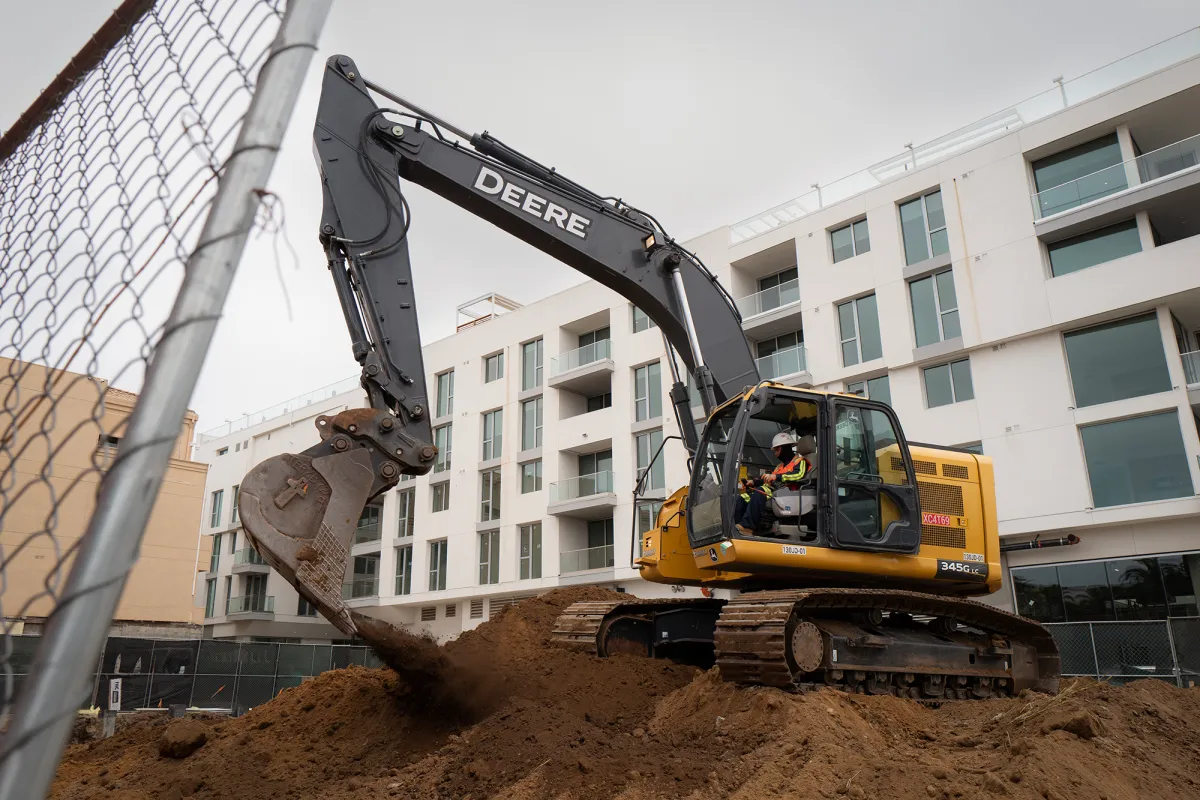This story was originally published by CalMatters. Sign up for their newsletters.
A controversial housing bill that would pave the way for more apartment buildings near major bus stops and train and subway stations across urban California is one step closer to becoming law after its author struck a last-minute deal with a long-time political foe, one of the state’s most powerful labor groups.
The State Building and Construction Trades Council, which represents union construction workers, agreed to drop its opposition to Senate Bill 79 in exchange for an amendment that would require some of the projects that make use of the bill to hire union workers.
The bill, authored by San Francisco Democratic Sen. Scott Wiener, would be one of the largest state-imposed housing densification efforts in recent memory. On residential and commercial lots within a walkable half-mile of well-trafficked public transit stops, developers would be allowed to build taller and denser housing — as high as six stories. That would apply in neighborhoods where local regulations restrict new development to single-family homes.
Wiener and backers of the bill argue that the state needs to turbo-charge housing construction to bring down the cost of living in California and that local zoning restrictions are among the barriers to that necessary building boom.
“This is exactly where we should be building more housing, right by our highest quality transit,” Wiener said.
Since Wiener rolled out the bill in March it has become a magnet of controversy. SB 79 only squeaked out of the Senate, clearing the opposition of two powerful Democratic committee chairs on its way, who largely objected to the fact that the bill did not include larger affordable housing requirements. The trades’ decision to withdraw from the fight significantly boosts the bill’s chances of becoming law.
“You hear from legislators all the time trying to be on the same side as the housing folks and the same side of labor — they don’t like when those sides are split,” said Louis Mirante, a lobbyist with the Bay Area Council, a business group that is backing the bill. “The trades removing their opposition is always helpful when you’re trying to pass a housing bill. That’s pretty cut and dry.”
Backed by “Yes in my backyard” activists, economic development boosters and public transit advocates, the bill has been fiercely opposed by neighborhood preservation groups, critics of market-rate development and a long list of local governments — including most recently, Los Angeles — who argue that the bill tramples on local prerogatives over what gets built and where.
Throughout that legislative gauntlet, the Trades Council have also been opposed. Not anymore.
“My hope is that this can be the beginning of shifting the dynamic where we’re all locking arms,” said Wiener. “We all want more housing. We all want more construction workers to be part of the middle class and not in poverty.”
Why unions changed direction
Wiener, California YIMBY founder Brian Hanlon and Trades Council president Chris Hannan announced a deal this morning.
“The labor standards in the amendments negotiated by the State Building Trades will create good jobs, provide training for the next generation of California’s skilled construction workforce, and ensure that this desperately needed housing is built with quality and that workers are treated with dignity,” Hannan said in a written statement.
Unite Here, a union representing hotel and other hospitality workers, also said they would be backing the bill. According to Wiener, future amendments to SB 79 will explicitly exclude hotel development projects from taking advantage of its provisions.
Under the terms of the deal, projects over 85-feet tall would be required to hire “skilled and trained” workers — effectively a hire-union requirement — if the developer receives a sufficient number of bids. Projects built on transit agency-owned land would likewise need to meet that requirement or enter into a direct contract with labor unions.
Over the last decade, the trades council has developed a reputation as a particularly well-organized and unyielding opponent of bills that ease restrictions on residential construction unless they also include broad minimum pay levels or union hiring requirements. The amendments announced today represent a step back from that all-or-nothing position. Most projects over 85 feet, for example, use concrete and steel frame construction, which require a higher skilled labor force that is often unionized anyway.
Other California housing bills
This isn’t the first time this year that the trades have been willing to take less than a full victory in exchange for dropping their opposition to a bill. When the Legislature was debating a proposal to exempt most new urban multifamily housing from the state’s premier environmental protection law, the trades accepted a concession that provided wage and hiring requirements for a small subset of projects.
The fact that California YIMBY and the trades council were in direct communication could itself represent a notable political shift in the way that housing bills are negotiated in the Capitol.
“Chris (Hannan) and I really have been spending a lot of time on this bill to the point where, quite frankly, some members of my coalition thought I was chasing at windmills,” said Hanlon of California YIMBY. “This bill here represents not just a deal on the specific language of SB 79, but it’s also a commitment from me and Chris to work together in the coming years to pass legislation to create more homebuilding opportunities in California.”
SB 79 still needs to be voted on by the entire Assembly and then once again by the Senate before the end-of-session Sept. 12 legislative deadline. If Gov. Gavin Newsom then signs it, it would be a particular feat for Wiener, who has tried and failed to pass similar legislation twice before.
“The bill is not guaranteed to pass, but we have more momentum today than we did yesterday,” said Wiener.

